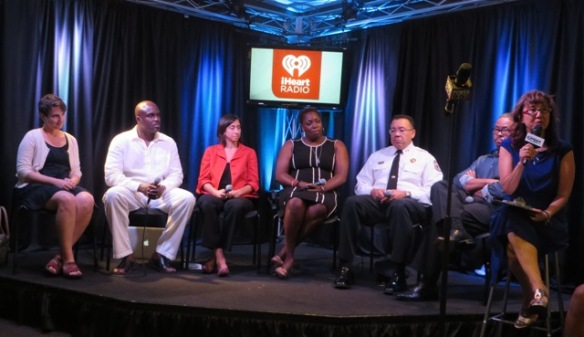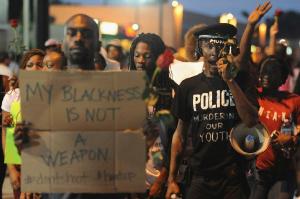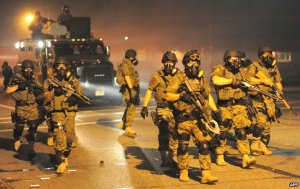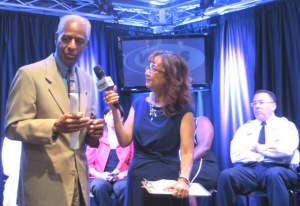It’s hard to absolutely declare which was the most disturbing component of the unrest the world witnessed in Ferguson, Mo., a hamlet north of Saint Louis. That national tragedy served as the subtext for a digital town hall hosted Monday by Clear Channel Philadelphia, where an intimate gathering of some 30 people of various ages and backgrounds came to discuss Ferguson and its aftermath.
PCHR was among the participants, with a delegation including Commissioners Marshall E. Freeman and Saadiq Jabbar Garner and PCHR Executive Director Rue Landau.

A set of activists and civic leaders gathered for a town hall meeting sponsored by Clear Channel Philadelphia. (l-r) Allison Pokras, executive director of Operation Understanding; author and journalist Solomon Jones; PCHR’s Rue Landau; educational consultant Andrea Lawful-Trainer; Philadelphia Police Deputy Commissioner Kevin J. Bethel; and the Rev. Alyn E. Waller, senior pastor of Enon Tabernacle Baptist Church. Loraine Ballard Morrill moderated.
In addition to Landau, the panel opening the dialogue featured Allison Pokras, executive director of Operation Understanding; author and journalist Solomon Jones; educational consultant Andrea Lawful-Trainer; Philadelphia Police Deputy Commissioner Kevin J. Bethel; and the Rev. Dr. Alyn E. Waller, senior pastor of Enon Tabernacle Baptist Church. Veteran public affairs director Loraine Ballard Morrill moderated the hour-long discussion that drew insights not just from panelists, but also an array of students, parents, law enforcement officers, educators and activists.
“What we saw in Ferguson is not indicative of what we see in policing,” said Bethel, who came to the discussion flanked with a multi-hued set of officers. “What has to happen from this conversation is a continuous dialogue. We have a responsibility to get out in the community and touch people in a positive way.”
The town hall streamed live from 4 to 5 p.m. on three web sites – WDASFM.com, Power99.com and MixPhiladelphia.com. Excerpts also will be featured on all six Clear Channel Philadelphia stations on Sunday morning, beginning at 6 a.m.
Different events in the aftermath of Michael Brown’s death under questionable circumstances have sparked anxieties. For some, the trigger was the prospect of an unarmed citizen being gunned down in the street and his body left to lay uncovered in a pool of his own blood. For others, it was the allegation that an unruly 18-year-old willingly charged an officer.
Still, for many Americans and those who look to this nation as a model democracy, visuals of police in tanks brandishing tear gas, rubber bullets and sound cannons against peaceful protestors coupled with those of people stripping area stores of their goods shook confidences.
Had the officer in question simply had been arrested after the shooting incident, there would be less room to question the motives or actions afterwards, said the Rev. Jacobus Nomdoe, a pastor visiting from South Africa. He said perceptions of a justice system stacked against black people is a familiar topic, and it was disappointing to see America follow a path that he and people in his country proved years ago had no good end.
“If he had been arrested, there would have been some kind of peace,” Nomdoe said. “If the process had started, on that day. It didn’t.”
That was at the heart of the frustration and disgust high school students in the audience expressed.
Some recounted daily brushes with prejudice and racism, especially those who live and attend school in predominantly white areas. They said they now feel less confident that justice would prevail if they found themselves in similar circumstances as Michael Brown – citing incidents such as the Trayvon Martin slaying, the death of Eric Garner in New York City and other reports of deaths involving unarmed black men and police.
Chiquilla M. Holt, a mother of two teens, said she understood their apprehensions.
“The fear that they are expressing is real,” Holt said. “As black people, we have to prove we’re OK. You have to prove you’re not a thug, that you’re not a threat. We can’t escape it.
“So there’s a fear of excessive force, that any kind of interaction with the police can lead to being killed,” she said. “White people don’t have that fear because they will be given the benefit of the doubt.”
They were all cautioned by the panelists against hopelessness and bitterness. Instead, they were told to seek allies, white and otherwise. Lawful-Trainer, for instance, said she joined in public conversations with young people, their parents and police in Abington, all of whom had concerns in wake of the Brown shooting. Alongside fellow civic leaders such as Jana Mallis of the Willow Grove NAACP, insightful exchanges are beginning.
“A lot of times you have allies in the room, but they are not sure what to say, so they stay quietly in the corner, not sure how they will be perceived,” Lawful-Trainer said. “You have to think about how you can get support. And we have to find a solution that will make young people feel safe.”
Philadelphia, with its history of being first-in-the-nation on so many fronts, could lead that charge and that change, Commissioner Garner told the assembled.
But that will require uncomfortable conversations to ensue, beyond the latest tragedy, the panel said.
Ferguson has sparked a series of public and private musings on race-based fears, economic inequality, responsible citizenship and law enforcement. Sustained change means unpacking the hows and whys behind the distrust and dissatisfaction that could lead to such civil disturbance. And that requires honest introspection and preventative investment, Waller said. He paraphrased an observation of writer and philosopher Victor Hugo:
Teach the ignorant as much as you can; society is culpable in not providing instruction for all, and it must answer for the night which it produces. If the soul is left in darkness, sins will be committed. The guilty one is not he who commits the sin, but the one who causes the darkness.
“If brave people in power made the right decisions on the day of that event,” Waller said, “we may not have seen the violence that we saw.
“If we are going to fix this, we all in this community are going to have to take pieces of it, because we are all guilty of a Ferguson or the potential of a Ferguson, in an Abington or in a Lower Merion,” he said.
And active participation of white men in such action is critical, Waller added. Recent polling about the Brown incident shows a considerable chasm in opinion, breaking down largely on racial lines.
Rue Landau echoed the call for fuller engagement.
Getting to the heart of this matter would mean creating models for preventing negative interactions with other groups – whether stemming from bias based on language, disability – especially among the deaf and those struggling with seizures – or gender identity.
While any group could fill in the blank of the persecuted or abused, the Ferguson case reflects a Ground Zero. At its heart was an all-too familiar and unresolved American binary antagonism of black vs. white, she said.
“I’d like to call on people for individual accountability, that white people have to speak up, to stand up, to call out people on their racism and to actually use their power to make change as well,” Landau said. “Nothing is going to change until we all take steps moving forward. It’s been 50 years since the signing of the Civil Rights Act.
“We should be further than we are now. We’ve made great moves and great strides, but we still have so much farther to go.”



